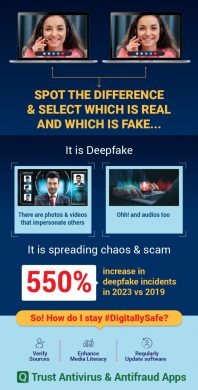Hey there! So, do you know what are deepfakes?
They’re like those videos where it seems like someone who you or the whole world knows, saying or doing something but it’s all AI magic. Imagine swapping faces in a video but with super smart computer tricks. Cool, right?
But here’s the catch! While they might seem fun, deepfakes can be pretty dangerous. They can spread fake news, impersonate people, and even create chaos.
According to the 2023 State of Deepfakes, introducing inexpensive AI technologies has caused a dramatic rise in deepfake videos. It has increased more than fivefold, i.e., a whooping 550% in 2023 as compared to 2019. So, buckle up as we dive into the world of deepfakes and their implications.
Investigating the Global Impact of Deepfake Scams

Example of deepfakes: original on the left, altered ‘deep fake’ on the right.
So, you know how in the last few years, deepfake incidents have been popping up everywhere? Yeah, they’ve got people quite worried, especially because of how they can be used in scams. It’s a new kind of danger that’s affecting regular folks, businesses, and society as a whole.
Let’s look at a situation that took place not too long ago that shows how big of a deal deepfakes can be.
A massive financial loss of USD 25.6 million was caused by a clever deepfake scheme to a global firm from Hong Kong. The fraud started when a worker in the finance department received a misleading email from the UK-based CFO of the company. This message, disguised as official business, spurred the start of a private money transaction. The victim was then lured into a group video conference. In the video call, the CFO and other prominent company officials were deepfakes and interacted with one another. Sounds alarming, right?
Now that you have understood how big of an impact deepfakes can have, let’s look at some common deepfake scams and how to tackle them!
Exploring the Risks and Realities of Deepfakes
Here’s what you need to watch out for when it comes to deepfakes:
- Fake Videos of Public Figures: What if you see two big leaders locking heads just due to a certain video by a leader? What if the video of that leader was deepfaked? Have you seen videos of famous people saying and doing things they never actually did? Yep, that’s deepfakes at work, spreading misinformation and messing with people’s opinions.
- Impersonation Scams: Imagine you receiving a call from your family or friends asking for an urgent fund transfer on some other number and all you get is scammed. This is how scammers pretend to be someone you know, like a friend or family member, to trick you into sending them money.
- Fake Audio Messages: They use deepfake tech to make fake voice recordings, often to scam you over the phone or through voice messages.
- Romance Scams: And let’s not overlook romance scams, where deepfakes create bogus profiles to lure unsuspecting folks into online relationships
- Financial Fraud: Deepfakes can mess with stock prices or cook up fake evidence for all sorts of financial schemes.
All these forms of deepfake scams are utilized ultimately to breach your privacy and get access to your passwords and your important information.
Now that you’re in the loop on deepfakes, let’s talk about how you can tackle them.

Essential Strategies For Combatting Deepfake Threats
Deepfakes are becoming increasingly sophisticated. Individuals, businesses, and organizations must stay alert. Here are some best practices to mitigate deepfake risks:
- Verify sources: Always double-check the authenticity of the content you encounter online especially if it seems suspicious or too good to be true.
- Enhance media literacy: Educate yourself and others about the existence of deepfakes and how to spot them. Look out for inconsistencies in audio, video, or image content.
- Stay updated: Keep abreast of the latest developments in deepfake technology. Also, update your security measures to better protect yourself and your organization with Quick Heal’s Total Security!
Keep Your Privacy Secured With Quick Heal Total Security and Deal with Deepafakes
Quick Heal serves as a frontline defender against evolving digital threats and proactively forecasts helping in zero-day protection. Quick Heal’s Total Security employs advanced detection, prevention, and educational measures at just Rs.1591!
- Behavioral Analysis: Behavioral detection technology that monitors and tracks the activities of each program and links. This technology further blocks the program and links immediately if its behavior is found suspicious.
- Real-time Monitoring and Data Breach Alerts: Quick Heal keeps an eye out for any fishy stuff happening in real-time. It checks all the videos, images, etc., to see if anything’s been tampered with. It also blocks dodgy apps and sites to stop problems before they start, with its Data Breach Alerts\
- Privacy Score: The newly introduced privacy score is based on their usage and ongoing vulnerabilities indicating if there are any breaches of sensitive user information. Privacy Score then gives users tips to ensure their identity remains protected and their privacy is intact while surfing in the digital world.
- Security Score: Then there’s this neat Security Score feature. It gives you a handy visual report on how strong your device is against all those nasty viruses and malware. It’s like a health check for your device’s immune system, helping you spot any weak spots that might need fixing.
- Updates and Patch Management: Quick Heal’s on top of it with updates and patches. Its antivirus software is always one step ahead of any cyber threat.
Secure Your Digital Identity in the Era of Deepfakes
Quick Heal serves as a frontline defender against any kind of threats. Quick Heal’s Total Security employs advanced detection, prevention, and educational measures at just Rs.1591!


